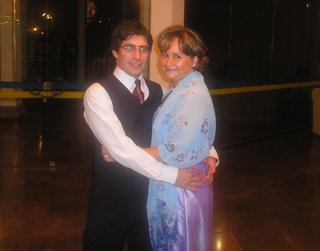Two weeks into my Bolivian adventure I was invited to a wedding by a friend of a work colleague of my friend Andrea where I chatted to a pretty architect called Marioly (as well as quite a few other pretty girls!).
Little did I know where it would lead.
Anyway, it feels like I have come full circle as with a little more than two weeks to go until I return to the
UK I was attending another wedding, this time with Marioly and the entire Lopez clan for her cousin Patti’s wedding in
La Paz.
While I have not quite got used to drinking rum and whisky with my meal (there will definitely be wine at OUR wedding), I realised how much has changed in the 10 months since I left England. While not quite indistinguishable from the locals, I have an excellent grasp of Spanish though sometimes it is still useful to say I do not understand. I have also discovered a bit of rhythm which I really did not think possible and danced the night away along with the other 250 guests.
There is so much I love about Bolivia, though one should be careful not to over romanticize the place as it is not without its faults or problems.
What I love: Marioly, the sunshine, La Paz, dancing, biogas projects, Wilstermann football club, cable tv which means I can watch Arsenal matches, the ease with which one can meet people, the regular national holidays and religious festivals (which coupled with the strikes makes it a miracle to actually do a day's work) & the sprawling Cancha market where you can buy anything from clothes and fruit to computers and second hand cars.
What I dislike: the lack of vegetables in the Bolivian diet, drinking rum or whisky with a meal, the difficulty to really get to know people beyond the superficial, the Bolivian work mentality (or lack of it), the incredible amounts of pointless paperwork and the corruption which while I have not witnessed directly is a constant theme and one that does so much damage to the country.
I cannot quite make up my mind if I like the fact that you can never plan with confidence in Bolivia. On the one hand it is quite refreshing to not have everything mapped out, yet it is also a bit tedious if you do not know whether the buses or planes are going to leave (the former are regularly on strike as they do not want to pay taxes, the latter national airline is on the verge of bankruptcy due to a mixture of corruption and mismanagement) or whether you can get to work (when Bolivians protest, they blockade the roads).
Evo Morales, Bolivia’s first indigenous President took the reigns of power in January 2006. He refuses to follow the US and World Bank’s prescriptions for economic reform which have served the country so badly for the last 20 years. There is therefore a chance that things may change for the better. I for one am willing to give him a chance, but it is still too early to say whether he will change the tide of history.

